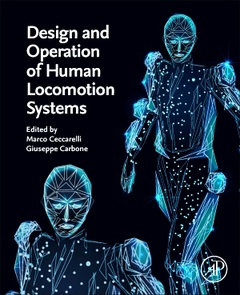Description
Design and Operation of Human Locomotion Systems
Coordinators: Cecarelli Marco, Carbone Giuseppe
Language: English
Subjects for Design and Operation of Human Locomotion Systems:
Keywords
Locomotion; design; control; biomechanics; performance enhancement
171 p. · 15x22.8 cm · Paperback
Description
/li>Contents
/li>Biography
/li>Comment
/li>
Design and Operation of Locomotion Systems examines recent advances in locomotion systems with multidisciplinary viewpoints, including mechanical design, biomechanics, control and computer science. In particular, the book addresses the specifications and requirements needed to achieve the proper design of locomotion systems. The book provides insights on the gait analysis of humans by considering image capture systems. It also studies human locomotion from a rehabilitation viewpoint and outlines the design and operation of exoskeletons, both for rehabilitation and human performance enhancement tasks. Additionally, the book content ranges from fundamental theory and mathematical formulations, to practical implementations and experimental testing procedures.
1. Mechanism Design for Locomotion Systems 2. Kinematics formulations for locomotion systems 3. Dynamic modelling and balancing 4. Human lower limb operation tracking via motion capture systems 5. Motion ranges of Human upper limbs for rehabilitation purposes 6. Design and control of exoskeletons for limb replacement or performance enhancement 7. Design of a human like locomotion for Humanoid Robots 8. Wearable sensors for locomotion
Giuseppe Carbone is Associate Professor at DIMEG, University of Calabria. He has got the Master and Ph.D. degree at University of Cassino (Italy) where he has been a Key Member of LARM (Laboratory of Robotics and Mechatronics) for about 20 years. In 2015-2017 he has been Senior Lecturer at Sheffield Hallam University (UK) and member of the executive board of Sheffield Robotics. In 2008-09 he has been delivering bilingual classes of Teoria de Machinas (Mechanics of Machinery) at University Carlos III Madrid, Spain. He has been Invited Visiting Professor at Humanoid Robotics Institute (Waseda University, Japan) in 2008 and 2014; Invited Visiting Professor at Beijing Institute of Aeronautics and Astronautics (Beihang University, Beijing, China) in 2013; Invited Visiting Professor at Pprime (University of Poiters, France) in 2019. His research interests cover aspects of Mechani
- Written and contributed by leading experts in robotics and locomotion systems
- Addresses humanoid locomotion from both design and control viewpoints
- Discusses the design and control of multi-legged locomotion systems
These books may interest you

Measurement of Human Locomotion 74.82 €



